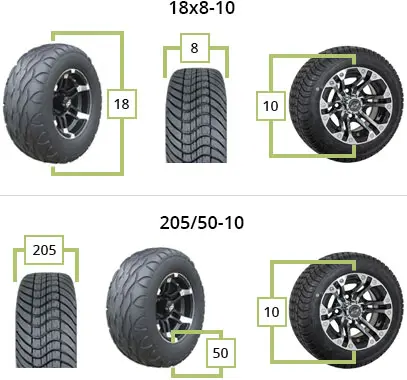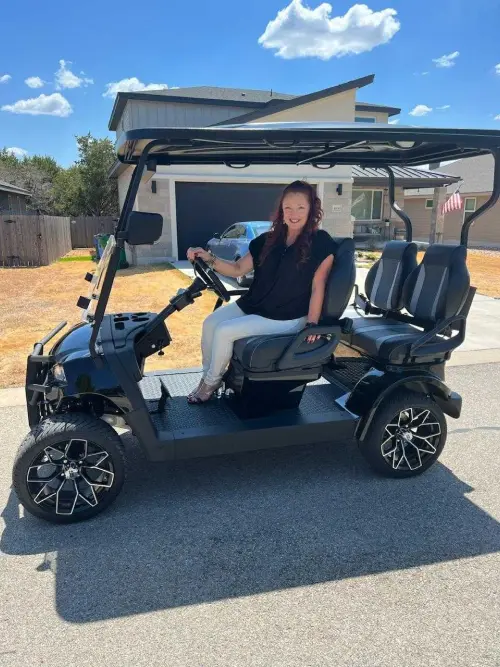When enhancing a golf cart’s performance and aesthetics, selecting the right wheels sometimes becomes just an afterthought. But this shouldn’t be the case as wheels are the unsung heroes of your golf cart—influencing appearance, handling, stability, and overall ride comfort. Whether you’re upgrading for functionality or style, understanding wheel sizing is the foundation of making an informed decision.
Here, we break down the essential factors of golf cart wheel dimensions, tire sizing, and maintenance to ensure you get the most out of your vehicle.
Understanding Golf Cart Wheel Dimensions
Golf cart wheels are defined by three key measurements: rim diameter, width, and offset. Each plays a vital role in the cart’s performance and fitment.
Rim Diameter
- Definition and Measurement: The rim diameter is the size of the wheel from one edge to the other, typically measured in inches.
- Appearance: Larger rims offer a modern and sporty look, while smaller rims give a classic and vintage feel.
- Impact on Tire Selection: The rim diameter determines the type of tire you can use. Smaller rims require taller sidewall tires, while larger rims pair with lower-profile tires for a sleek appearance
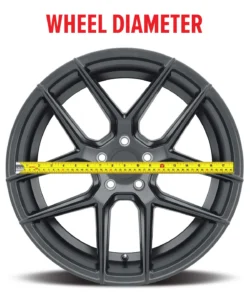
Width
- Definition and Measurement: Width measures the distance between the inner and outer edges of the rim.
- Effect on Contact Patch: Wider wheels provide more grip and stability, ideal for off-road conditions. Narrower wheels reduce rolling resistance, improving efficiency on smooth surfaces.
- Fitment Considerations: Excessively wide wheels may require modifications to avoid rubbing against the chassis or suspension.
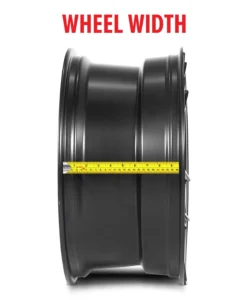
Offset
- Definition and Measurement: Offset is the distance between the wheel’s mounting surface and its centerline.
- Influence on Fitment: Positive offset wheels sit closer to the centerline of the cart, while negative offset wheels extend outward. Proper offset ensures clearance between the wheel and suspension.
- Impact on Handling: Offset adjustments affect track width, influencing stability and cornering performance.
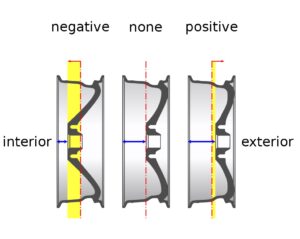
Common Golf Cart Wheel Sizes
Choosing the right wheel size depends on your cart’s purpose and your aesthetic preferences. Here are the most common sizes:
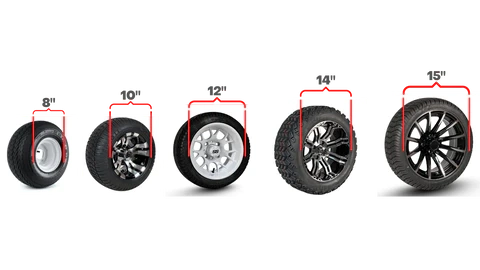
8-inch:
Standard size for most golf carts. Affordable and practical, especially for casual use.
10-inch:
A balance of style and functionality, often chosen by users adding lift kits.
12-inch:
Popular for off-roading and a more aggressive look.
14-inch:
Offers maximum ground clearance and a bold aesthetic but can be more expensive.
15-inch:
Less common but ideal for extreme customization and ground clearance, often requiring cart modifications.
Factors to Consider When Choosing Golf Cart Wheels
Choosing the perfect wheels for your golf cart affects its performance, comfort, and aesthetics. Here are the key factors to keep in mind as you make your selection:
Terrain and Usage
For rugged terrain, opt for wheels with robust construction and aggressive treads. On smooth and paved surfaces, smaller, smoother tires may be more efficient.
Load Capacity
Ensure the wheels and tires can support the weight of the cart and its load, especially for heavy-duty tasks like hauling.
Style and Personalization
Wheels come in various designs and finishes to match your cart’s overall aesthetic. From modern and sleek to classic and understated, choose a style that complements your vehicle.
Tire Compatibility
Ensure the wheels are compatible with your preferred tires in terms of size, load capacity, and speed rating.
Durability and Material Quality
Look for wheels made from materials like aluminum or steel for strength and corrosion resistance. High-quality wheels offer better longevity and performance.
Budget
Wheel prices vary based on design, material, and brand. Set a budget and prioritize the features that matter most to you, balancing cost with quality.
Golf Cart Wheel Maintenance Tips
To keep your wheels in top condition and prevent common golf cart issues, follow these maintenance guidelines:
Regular Checks
- Check tire pressure weekly and maintain it according to manufacturer recommendations.
- Inspect wheels and tires for cracks, cuts, or uneven wear.
- Ensure lug nuts are properly tightened.
- Monitor wheel alignment for signs like uneven tire wear or difficulty steering.
Cleaning
- Wash wheels with mild soap and water. Avoid harsh chemicals that can damage finishes.
- Dry thoroughly to prevent rust and corrosion.
Storage
- Store the golf cart on a level surface when not in use.
- Inflate tires slightly above recommended pressure for long-term storage.
- Cover wheels to protect them from sun and weather damage.
Additional Tips
- Rotate tires regularly to ensure even wear.
- Balance wheels periodically to prevent vibrations and uneven wear.
- Address any issues promptly to avoid further damage.
Ensuring Optimal Performance and Longevity
Selecting the right wheels and maintaining them properly maximizes your golf cart’s performance and lifespan. Whether you’re cruising on smooth greens or tackling rugged trails, the right wheels make all the difference. Take charge of your golf cart experience today by exploring high-quality wheel options from Golf Carts of ATX—the best golf cart dealer in Austin. Contact us now to find the perfect wheels for your ride!
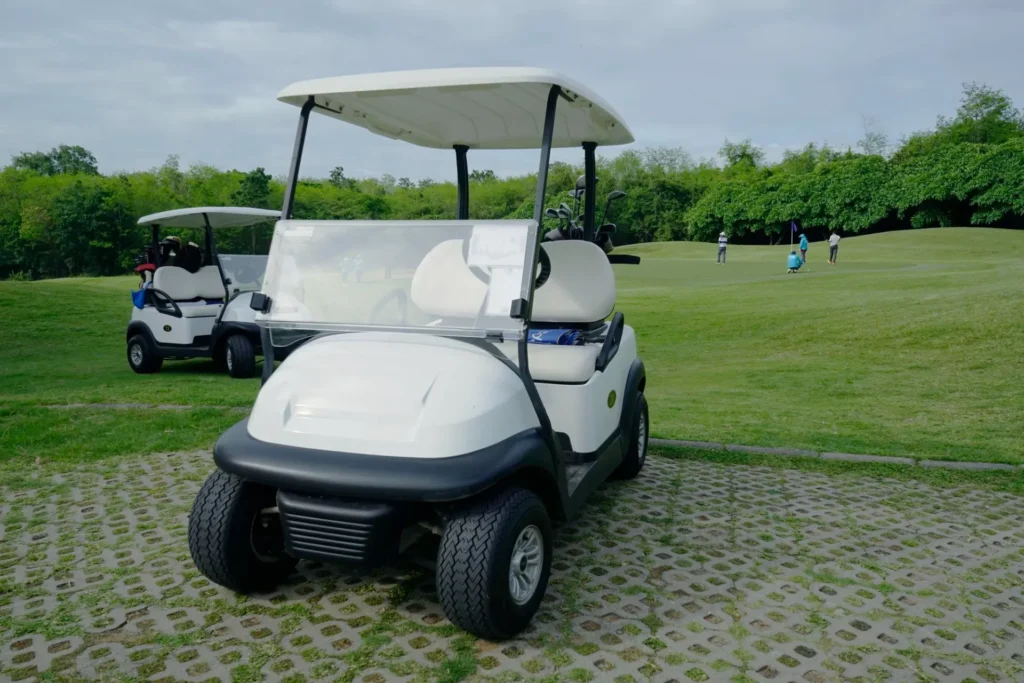
Frequently Asked Questions
How are golf cart wheels measured?
Wheels are measured by diameter, width, and bolt pattern. Diameter and width are in inches, while the bolt pattern indicates the number and arrangement of bolt holes.
What size wheels fit a golf cart?
Standard wheels range from 8 to 12 inches in diameter and 7 to 10 inches in width. Always consult your manual or dealer for fitment guidance.
How do I determine the correct tire size for my golf cart?
Refer to your cart’s manual or consult with a knowledgeable dealer. Consider terrain, load capacity, and desired performance.
Can I install larger wheels on my golf cart for improved performance?
Yes, but ensure compatibility with your cart’s suspension system and overall specifications. Larger wheels can provide more ground clearance and traction.
What is the typical lifespan of golf cart tires?
Tires generally last 4 to 6 years, depending on usage and maintenance. Regular inspections and replacements are a must.
Are there specific tire options recommended for off-road golf cart use?
Yes, opt for tires with aggressive tread patterns and durable construction labeled “all-terrain” or “off-road.”

